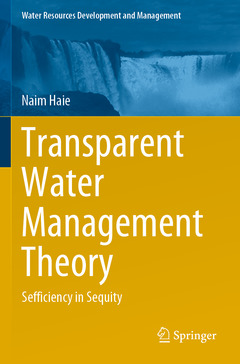Description
Transparent Water Management Theory, 1st ed. 2021
Sefficiency in Sequity
Water Resources Development and Management Series
Author: Haie Naim
Language: English
Subjects for Transparent Water Management Theory:
Transparent Water Management Theory
Publication date: 06-2021
119 p. · 15.5x23.5 cm · Paperback
Publication date: 06-2021
119 p. · 15.5x23.5 cm · Paperback
Approximative price 52.74 €
In Print (Delivery period: 15 days).
Add to cart
Transparent Water Management Theory
Publication date: 06-2020
Support: Print on demand
Publication date: 06-2020
Support: Print on demand
Description
/li>Contents
/li>Biography
/li>Comment
/li>
This book provides a solid foundation for a comprehensive, systemic and water-centric approach to water management. Said approach integrates two performance principles essential for sustainable water use systems, namely equity and efficiency. Further, it decreases the policy space for decision-making encountered by water managers and makes it easier to arrive at reasonable solutions because of the bounded rationality inherent in its development. By combining the distributive and aggregative principles, the approach offers a transparent and autonomous structure for gathering water data and enabling stakeholder involvement. Lastly, it employs and promotes a unifying language for all types of water use systems, e.g. urban, agricultural and industrial.
Introduction.- Terminology.- Theory.- Sefficiency.- Sequity.- Applications.
Naim Haie is a Professor of Water Resources and the Environment at the University of Minho, Portugal. Holding a Ph.D. from Utah State University, USA, he has been involved in projects in Asia, the Americas and Europe. His team was actively involved in the final approval of the European Union (EU) Water Framework Directive during Portugal’s EU Presidency. Recently, he has developed the Sefficiency (Sustainable efficiency) and Sequity (Sustainable equity) frameworks to promote the best water management practices. He was the first to develop a hydrodynamic model of (surged) irrigation using an Eulerian system, and has served as Director and Vice-President of the Executive Board at the International Water Resources Association.
Provides a solid foundation for a comprehensive, systemic, and water-centric approach to water management Integrates two performance principles essential for sustainable water use systems—equity and efficiency Presents a transparent and autonomous structure for gathering water data
© 2024 LAVOISIER S.A.S.




